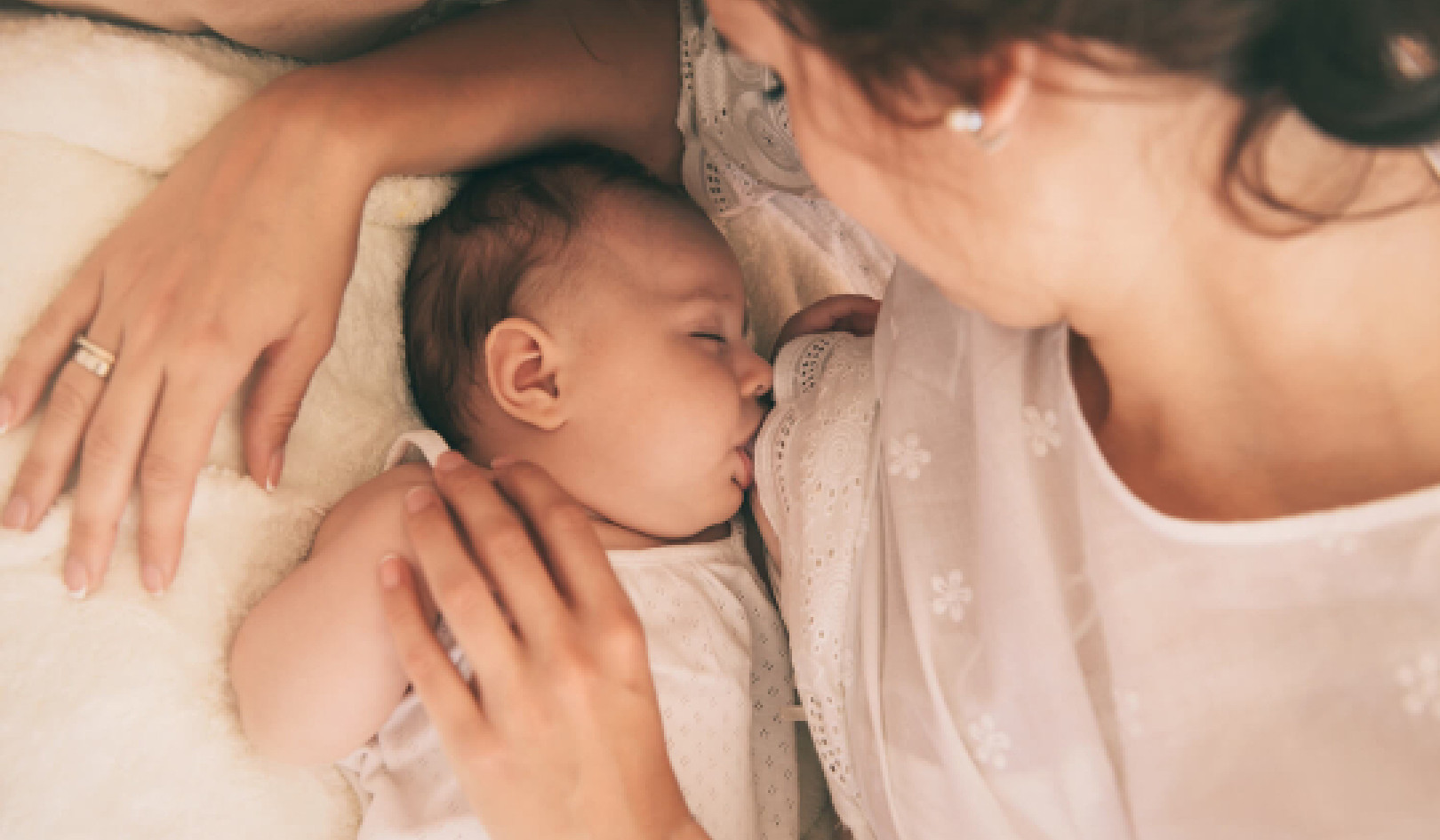
Child's Image by Susan Beattie and Woman's Image by NIPUN SHARMA
In one American community, a manicured lawn in an upper middle class neighborhood encloses a house where a seemingly happy family resides. A Volvo and an M-class Mercedes parked outside in the driveway imply confidence and status. From the outside, no one would ever suspect there lies inside a broken child in the making. This is the home of Tammy, Paul, and Michael Breashears. Daily, Tammy and Paul leave their 2-year-old in the care of Nanny Elsa to pursue their very active careers as a marketing executive and lawyer respectively.
Look deeper and you'll find what's wrong with this picture.
And I Am Feeling So Small...
Michael is crying to be held. Left in a dark room far from his parents he must endure the entire night alone. His parents choose to let him wail through the night until exhaustion brings him to sleep. For Elsa, in the very next room, the relentless, unanswered pleas to be nurtured are torturous. She feels Michael's raw emotion. Elsa knows that all this baby wants is to be comforted. In a baby's small world, needs are basic; to feel loved, safe, warm, and to be nourished.
Elsa loves this little boy like he was her own and is pulled to enter Michael's room, but she can't. Elsa is unable to follow her heart's lead to comfort him. Tammy has decreed the way it should be. Michael is now wailing her name. In agony Elsa covers her ears with a pillow to muffle his screams. She prays that Michael will stop calling out for her, and worries what long-term effect this neglect will have on his vulnerable heart. Why doesn't his own mother feel the same way? Why don't the endless cries draw Tammy to soothe him?
Tammy's beliefs on parenting are derived from books as well as other outside sources and opinions. She doesn't listen to what her child is telling her. The outside voices drown the pure voice of her heart that intuitively understands Michael. He doesn't want to be cast out alone in a dark room, away from his mother. He longs to be safe under her protective wing.
Say Something, I'm Giving Up On You...
This scenario is repeated for many months. Night after night Michael's mom lets him cry himself to sleep. Then every subsequent day, Michael demonstrates his unhappiness and frustration through his behavior. Daily, Michael is angry, cries continuously, and is nervous and often aggressive. Mom holds her ground. She accuses Michael of being manipulative and considers his defiance to be a negative personality trait he was born with. Tammy is determined not to give in to his tantrums and repeats the mantra "he has to learn".
What Tammy doesn't realize is that Michael is trying to tell her something. She doesn't understand that Michael is learning what she is teaching him. He is learning to be angry, aggressive, and to shut down. Michael is acting out as opposed to communicating. There is no other recourse; his mother has demonstrated to him that communication in their home does not exist.
Parents teach their children how to relate in the world. A baby whose cries are repeatedly ignored grows to believe expression is futile. A child who is raised in a family where I love you is never communicated becomes an adult incapable of expressing this sentiment. A teenager who is neglected feels shame. All of these instances breed fear of not being worthy of love.
Fear is instilled in many children as early as infancy. It begins with the seemingly simple act of putting babies into cold nurseries to sleep alone. Newborns are expected to instantaneously go from a warm womb into a lonely crib. This separation prohibits parents from knowing their children. It creates an ongoing chain reaction of indifference.
Listening to outside sources on how they should raise kids, parents become unable to read signals, incapable of really understanding and knowing their children. Even when a child is suffering from mental or genetic disorders, the parent repeatedly does not provide the child with the help it needs. They are unable to, because they simply are not aware of the signs of trouble.
I'm Sorry I Couldn't Get To You...
We are at a crisis point. Kids all over America are depressed. Many suffer high levels of fear, which manifests as anger, depression, defiance, and aggression. The resentment children feel is so great many want to harm those who harmed them.
Those particularly prone to violent acting out are boys. Girls exhibit anger in other less brutal ways. Society permits the female species to be sensitive. Girls are allowed to emote and cry -- boys are not. Angry girls exhibit rage by harming themselves. Many turn anorexic or bulimic, and frequently become involved in threatening relationships as teens. Current statistics show that 1 out of 4 girls in high school is in an abusive relationship.
Boys, as we have seen, often exhibit their rage by killing. From young boys who kill infants to teenagers who slaughter their classmates in school massacres. The tragic trend of children who kill is reaching epidemic proportions. The plot may vary from a teen that blows his entire family away with a shotgun to gang violence, but the cause is always the same. These children are raised to feel unsafe, unloved, and then act out with rage and self-abuse.
... And I Will Stumble And Fall
In Littleton, Colorado, The Rev. Don Marxhausen, who counseled Thomas and Susan Klebold after the Columbine High School shootings said the parents were devastated and could not believe the killer they were reading about was their son Dylan. "They thought they were doing the best job they could," the pastor said.
It's peculiar that most parents who raise angry and rageful kids can not trace it back to home. They quickly look to outside sources to place the blame. Media violence does not cause children to be violent. If a child is angry, violent movies, television shows and music merely add fuel to an already smoldering fire.
Parenting is the most difficult job there is because of the immense responsibility of shaping another human being. A child's character and inner structure are like putty in the hands of his parents. Parents hold the power to shape and mold a child's vulnerable constitution. With such big stakes, it is peculiar that most moms and dads embark on becoming parents without any kind of instruction or training. So much can go wrong...
Subtitles by InnerSelf (from the song "Say Something")
This article is excerpted from the book
"Broken Wings Can Learn to Fly: Why Children are Broken
and How They Can Be Healed" by Francesca Cappucci Fordyce.
o order the book, contact Francesca at:
Related Book:
Raising Good Humans: A Mindful Guide to Breaking the Cycle of Reactive Parenting and Raising Kind, Confident Kids
by Hunter Clarke-Fields MSAE
 With this book, you’ll find powerful mindfulness skills for calming your own stress response when difficult emotions arise. You’ll also discover strategies for cultivating respectful communication, effective conflict resolution, and reflective listening. In the process, you’ll learn to examine your own unhelpful patterns and ingrained reactions that reflect the generational habits shaped by your parents, so you can break the cycle and respond to your children in more skillful ways.
With this book, you’ll find powerful mindfulness skills for calming your own stress response when difficult emotions arise. You’ll also discover strategies for cultivating respectful communication, effective conflict resolution, and reflective listening. In the process, you’ll learn to examine your own unhelpful patterns and ingrained reactions that reflect the generational habits shaped by your parents, so you can break the cycle and respond to your children in more skillful ways.
For more info, or to order this book, click here. (Also available as a Kindle edition and as an Audiobook.)
About The Author
 Francesca Cappucci Fordyce is a journalist who has worked in television, radio, and print mediums. She worked as an on-air reporter for 10 years with ABC News in Los Angeles. She is now a stay-at-home mom. Being a "broken child" who grew into a "broken person", she made it a priority to heal her pain because she did not want her child to inherit her negative traits. She can be contacted at:
Francesca Cappucci Fordyce is a journalist who has worked in television, radio, and print mediums. She worked as an on-air reporter for 10 years with ABC News in Los Angeles. She is now a stay-at-home mom. Being a "broken child" who grew into a "broken person", she made it a priority to heal her pain because she did not want her child to inherit her negative traits. She can be contacted at:





























